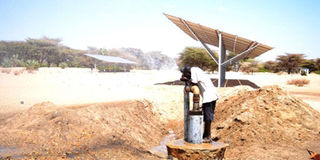Study on groundwater to unlock farming potential in Kwale

A man drinks water from a water pump installed on an aquifer. Scientists are seeking to understand the quality and quantity of water stored underground in Kwale, to unlock the region's potential for economic growth of the poor. FILE PHOTO | NMG
What you need to know:
- For the past two years, scientists from the University of Nairobi, the University of Barcelona, Oxford University, and the Jomo Kenyatta University of Agriculture and Technology have been studying the groundwater system in Kwale, with an aim of developing a tool that will assist in managing the resource for sustainable use.
- So far, we do not know what we have, because we have not done adequate studies on groundwater
- he Kwale International Sugar Company Limited has been using groundwater abstracted through boreholes to irrigate some 8,000 hectares under sugarcane during dry seasons, and whenever their dams are depleted.
- Through the study dubbed Unlocking the Potential of Groundwater for the Poor (UpGro), the firm and other companies that use ground water in Kwale can now understand that their water comes from what is known as Msambweni aquifer.
Using groundwater, a company in Kwale County has demonstrated that it is possible to invest in large scale agriculture in dry areas using intensive farming methods.
And now, scientists are seeking to understand the quality and quantity of water stored underground in the region to unlock its potential for economic growth of the poor.
For the past two years, scientists from the University of Nairobi, the University of Barcelona, Oxford University, and the Jomo Kenyatta University of Agriculture and Technology have been studying the groundwater system in Kwale, with an aim of developing a tool that will assist in managing the resource for sustainable use.
The tool, which is a computer programme, will be able to flag off certain risks associated with groundwater quantity and quality based on hydro-meteorological, hydro-geological, water abstraction demand as well as socio-economic data within the study area.
"So far, we do not know what we have, because we have not done adequate studies on groundwater," said Daniel Olago, a geology professor at the University of Nairobi, and one of the lead researchers.
The Kwale International Sugar Company Limited has been using groundwater abstracted through boreholes to irrigate some 8,000 hectares under sugarcane during dry seasons, and whenever their dams are depleted.
“There is a lot of potential in the groundwater, but it can only be used sustainably if we understand the amount of water in the underground aquifers, the water quality, how the aquifers refill themselves, and how much of the water can be abstracted without depleting the storage,” said Calvince Wara, research operations manager for Rural Focus.
According to Pamela Ogada, the general manager at Kwale Sugar, yields from irrigated agriculture are always higher than those from rain-fed agriculture.
“With drip irrigation, it is easier to give the plant the exact amount of water it requires to grow well, as well we can supply liquid fertiliser through the same drip in a process known as fertigation,” she told the Seeds of Gold.
Through the study dubbed Unlocking the Potential of Groundwater for the Poor (UpGro), the firm and other companies that use ground water in Kwale can now understand that their water comes from what is known as Msambweni aquifer.
"Through this study, we seek to know how much of the rainwater is being recharged through rainfall and infiltrations, how much of it is stored, and so how much of it can be sustainably used," said Prof Olago.
According to the study, the Msambweni aquifer has sufficient water to serve the firm’s large-scale agriculture and other users, including one mining company, the hotel industry and the local community.
But the tool has already given a warning signal that in case water in the aquifers is over abstracted, then there is a possibility of saltwater infiltration, and in such a scenario, the water quality in the aquifer will be compromised.
“It is, therefore, absolutely paramount that this water resource needs to be protected,” said Wara.




